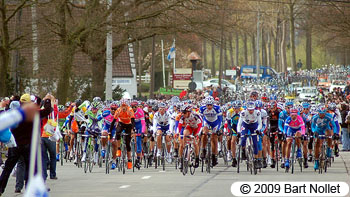 East Timor President Jose Ramos-Horta has thrown down the gauntlet to foreign cyclists ahead of the inaugural Tour de Timor and warned the race will be one of the toughest in the world.
East Timor President Jose Ramos-Horta has thrown down the gauntlet to foreign cyclists ahead of the inaugural Tour de Timor and warned the race will be one of the toughest in the world.
The tour from August 24 to 28 will be a highlight of festivities surrounding the 10th anniversary of East Timor’s vote for independence from Indonesia, and the biggest sporting event the tiny country has ever held.
The president has been enthusiastically promoting the race, which the government is hoping will boost not only tourism but also the fledgling nation’s image as a peaceful country after years of unrest.
The Tour will be “one of the most challenging bike races anywhere in the world, probably tougher than the Tour de France”, he said.
Sixty international cyclists from Australia, New Zealand and Malaysia have already signed up, including Australian mountain biker Dylan Cooper, while East Timor is expected to enter between three to six teams of four riders.
Nobel Peace Prize laureate Ramos-Horta said his country’s proud amateur cyclists were ready to take on the world, particularly regional sporting giants Australia and New Zealand.
“Australians and New Zealanders are known to be very tough competitors,” he told AFP.
“But they cannot compete against the tough East Timorese so I think the moment they see the geography, the conditions, they will probably prefer to stay in Byron Bay (Australia) and enjoy the sunshine there.”
Up to 250 participants from around the Asia-Pacific region are expected to take part in the 350-kilometre (217-mile) race around the rugged, tropical half-island state.
Like its French predecessor the Tour de Timor will see riders battle it out over stages for a yellow jersey, with total prize money of 75,000 dollars.
Cyclists will tackle nine districts over five days, starting with a coastal jaunt east from the capital Dili, up short, steep hills and through fishing villages to Baucau.
Day two will take them onto rock-strewn back-roads ending with a 20-kilometre downhill run to Viqueque.
The race then heads over river beds and probably the worst roads ever seen in a cycling tour, before a backbreaking 2,000-metre (6,560-foot) climb along 70 kilometres of country roads, through highland villages and dense forest.
The final descent on August 28 will see competitors wind their way through rice paddies and Timor’s famous coffee plantations back to Dili, with a flat sprint at the end of the 95-kilometre stretch. Despite a severe lack of resources, including decent bikes, 28-year-old Jorge de Silva who represented East Timor at the recent Arafura Games in Darwin, northern Australia, says local teams are up for the challenge.
“It’s the first time we’ve had an opportunity to have international teams in our country since independence,” he said. “It’s in our backyard, so just come over and we’ll try you out.”
Each of the national teams will be sponsored and receive new equipment, so De Silva is hoping to replace the seven-year-old bike he has been training on.
But he admitted his countrymen had a lot to learn about competitive sport.
“When I was in Darwin I noticed that all the athletes had specific food. The cyclists, when they came back in, they had food with nutrition that replenished what they lost and to us it’s something new, we don’t have that,” he said.
Tour public relations manager Sean Borrell said the event would require “another level of development” from local organisers whose only previous experience with putting together such a race was the 2004 Timor Challenge.
“It will be recorded professionally, timed professionally and there is prize money, so this is the first step of what is hopefully to be an annual event,” he said. “The president’s vision is to create a cycling event that is in the same league as international events.”
The Malaysian National Cycling Federation will send eight riders; the Asean Cycling Association is on board to lend technical expertise and the racing federation of Singapore has expressed interest in participating.
Borrell said he was also hoping to organise teams representing the international peacekeepers who were redeployed to Timor after civil unrest in 2006, as well as the United Nations police based in the country.
Corporate sponsorship has come from Australian airline Airnorth, which has pledged 220 Darwin-Dili return flights for riders, media and support. East Timor voted almost 80 percent in favour of independence from Indonesia in a referendum on August 30, 1999.
More than 200,000 people were killed in fighting between pro- and anti-independence groups, and the departing Indonesian army and its proxies destroyed much of the country’s infrastructure on its way out.